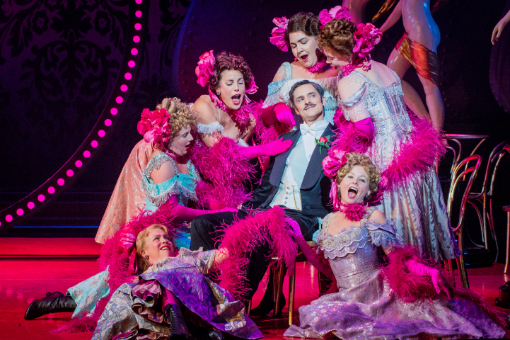 United Kingdom Lehár, The Merry Widow: Chorus and Orchestra of Opera North / Martin André (conductor). The Lowry Theatre, Salford Quays. 15.11.2018. (RJF)
United Kingdom Lehár, The Merry Widow: Chorus and Orchestra of Opera North / Martin André (conductor). The Lowry Theatre, Salford Quays. 15.11.2018. (RJF)

Cast:
Countess Hanna Glawari – Katie Bird
Count Danilo – Quirijn de Lang
Baron Mirko Zeta – Geoffrey Dolton
Valencienne – Gillene Butterfield
Camille de Rosillon – Nicholas Watts
Consul – Nicholas Butterfield
Production:
Director – Giles Havergal
Set and Costume designer – Leslie Travers
Choreographer – Stuart Hopps
Lighting designer – Oliver Fenwick
If the previous night’s performance of Puccini’s Tosca (review click here) had reached appropriately fraught dramatic levels, this second night of Opera North’s visit to The Lowry was a complete contrast of music theatre, but realised in similar excellence of performance. How much the latter was due to the presence of the original director I do not know for certain, but in terms of quality of staging and performance (under conductor Martin André) the evening was first-rate. Importantly to state early on, and not leave it to the end, was the involvement of chorus members in minor parts, and particularly in performing the can-can and the like. It indicates something of the quality of commitment of members of the company and is to be noted and commended.
Back to the realistic present, or that of a century ago in the opulent times of the Paris of 1905 in Lehár’s operetta of sexual intrigue, and threatened national budgets, that is the basis of his Merry Widow. The single set wears well in both its simplicity and basis of utilisation, a few moves and variations in the lighting being all that is necessary to bring the period to life and provide the basis for the risqué goings on which the plot is centred. Tables, elegant statues of scantily draped nubile young ladies, each holding a globe that are lit in the later frivolities at Maxim’s, along with draped simulations of ornate chandeliers that, with appropriate backlighting look superbly real, and Paris was our oyster.
No fault of the production, or musical standard, if Act I drags a little, certainly compared with the goings on and quality of musical creation post interval, when Lehár’s creativity goes up in leaps and bounds in quality and quantity. This is especially so in this production, with Maxim’s and the can-can girls going at a pace to provide high quality entertainment, whilst fully complementing the amorous infidelities and goings on around them. The latter realised by the singing and acting of the named soloists and also chorus members, the latter fully involved as actors too. Sometimes the plot of who is cuckolding who gets complicated even in Kit Hesketh-Harvey’s fresh English version. But it is all in good fun, albeit questionable morally perhaps. Baron Zeta – who has to worry about Pontevedro’s budget, as well as his wife’s extra mural activities – is superb in Geoffrey Dalton’s sung and acted portrayal: his Pontevedrian Ambassador skips in and about in appropriate National Costume. Danilo, chosen as the perfect answer to Pontevedro’s need for a spouse for the Countess and thus secure her fortune stays within the nearly bankrupt country, was appropriately smooth and elegant in his acted and sung interpretation.
The Parisian contingent, suitably costumed in dress suits were played as to the manner born by Nicholas Watts and Nicholas Butterfield, whilst Katie Bird whooped them all up with her elegance and singing, particularly her rending of ‘Vilja’. Whilst not upstaging the established troupe, stepping in for an indisposed Amy Freston as Valencienne, Gillene Butterfield not only sang and acted well, but did a cartwheel and the splits too! I have seen and heard role covers many times over the years, but those additional skills were well above the call of duty. Well done to her and the company policy of proper stage rehearsal time for covers and also employing singers of quality for the roles.
All in all, this Opera North visit to The Lowry was too brief a season of drama and operetta, albeit the contrasting styles of the chosen works coalesced well. It certainly more than compensated me for a frustrating journey of an hour and a quarter for eighteen miles to get to The Lowry, as road works in the vicinity extend now to five years. This time to add a tram track, just when the conversion to smart motorway on the M60 reached fruition!
Some people questioned the use of titles in the sung parts. I didn’t. The plot has its complexities and they help newcomers to the work and genre get the gist of what is going on. There is often not the time, especially if journey time was like mine, to read the programme beforehand.
Robert J. Farr
